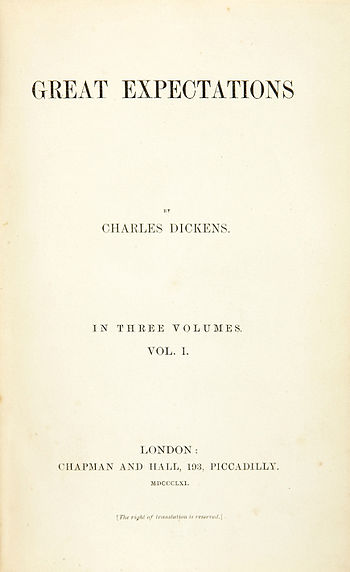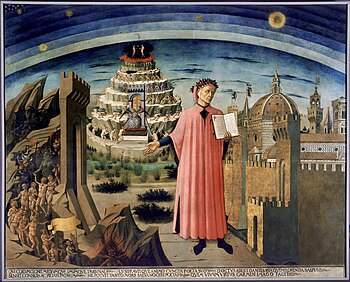Books
51
5
Fans in Сategory
Here are the most popular Books in the Favoteca community. In the recommendations tab, you'll see which Books are most popular among your like-minded peers. Enrich your collection by exploring the preferences of people whose taste is most similar to yours.

Great Expectations
Great Expectations is the thirteenth novel by English author Charles Dickens and his penultimate completed novel. The novel is a bildungsroman and depicts the education of an orphan nicknamed Pip. It is Dickens' second novel, after David Copperfield, to be fully narrated in the first person. The novel was first published as a serial in Dickens's weekly periodical All the Year Round, from 1 December 1860 to August 1861. In October 1861, Chapman & Hall published the novel in three volumes.

Medea (play)
Medea (Ancient Greek: Μήδεια, Mēdeia) is a tragedy by the ancient Greek playwright Euripides based on a myth. It was first performed in 431 BC as part of a trilogy, the other plays of which have not survived. Its plot centers on the actions of Medea, a former princess of the kingdom of Colchis and the wife of Jason; she finds her position in the world threatened as Jason leaves her for a princess of Corinth and takes vengeance on him by murdering his new wife and her own two sons, before escaping to Athens to start a new life.

A Doll's House
A Doll's House (Danish and Bokmål: Et dukkehjem; also translated as A Doll House) is a three-act play written by Norwegian playwright Henrik Ibsen. It premiered at the Royal Danish Theatre in Copenhagen, Denmark, on 21 December 1879, having been published earlier that month. The play is set in a Norwegian town c. 1879.

Hunger (Hamsun novel)
Hunger (Norwegian: Sult) is a novel by the Norwegian author Knut Hamsun published in 1890 by P.G. Philipsens Forlag. The novel has been hailed as the literary opening of the 20th century and an outstanding example of modern, psychology-driven literature. Hunger portrays the irrationality of the human mind in an intriguing and sometimes humorous manner.

One Thousand and One Nights
One Thousand and One Nights (Arabic: أَلْفُ لَيْلَةٍ وَلَيْلَةٌ,Alf Laylah wa-Laylah), is a collection of Middle Eastern folktales compiled in the Arabic language during the Islamic Golden Age. It is often known in English as the Arabian Nights, from the first English-language edition (c. 1706–1721), which rendered the title as The Arabian Nights' Entertainment.

Don Quixote
Don Quixote, the full title being The Ingenious Gentleman Don Quixote of La Mancha, is a Spanish novel by Miguel de Cervantes. It was originally published in two parts, in 1605 and 1615. Considered a founding work of Western literature, it is often said to be the first modern novel. The novel has been labelled by many well-known authors as the "best book of all time" and the "best and most central work in world literature". Don Quixote is also one of the most-translated books in the world and one of the best-selling novels of all time.

Hamlet
The Tragedy of Hamlet, Prince of Denmark, often shortened to Hamlet (/ˈhæmlɪt/), is a tragedy written by William Shakespeare sometime between 1599 and 1601. It is Shakespeare's longest play. Set in Denmark, the play depicts Prince Hamlet and his attempts to exact revenge against his uncle, Claudius, who has murdered Hamlet's father in order to seize his throne and marry Hamlet's mother. Hamlet is considered among the "most powerful and influential tragedies in the English language", with a story capable of "seemingly endless retelling and adaptation by others." It is widely considered one of the greatest plays of all time. Three different early versions of the play are extant: the First Quarto (Q1, 1603); the Second Quarto (Q2, 1604); and the First Folio (F1, 1623). Each version includes lines and passages missing from the others.

One Hundred Years of Solitude
One Hundred Years of Solitude (Spanish: Cien años de soledad, Latin American Spanish: [sjen ˈaɲos ðe soleˈðað]) is a 1967 novel by Colombian author Gabriel García Márquez that tells the multi-generational story of the Buendía family, whose patriarch, José Arcadio Buendía, founded the fictitious town of Macondo. The novel is often cited as one of the supreme achievements in world literature. It was recognized as one of the most important works of the Spanish language during the 4th International Conference of the Spanish Language held in Cartagena in March 2007.

Madame Bovary
Madame Bovary (/ˈboʊvəri/; French: [madam bɔvaʁi]), originally published as Madame Bovary: Provincial Manners (French: Madame Bovary: Mœurs de province [madam bɔvaʁi mœʁ(s) də pʁɔvɛ̃s]), is a novel by French writer Gustave Flaubert, published in 1857. The eponymous character lives beyond her means in order to escape the banalities and emptiness of provincial life.

Ulysses (novel)
Ulysses is a modernist novel by the Irish writer James Joyce. Partially serialized in the American journal The Little Review from March 1918 to December 1920, the entire work was published in Paris by Sylvia Beach on 2 February 1922, Joyce's fortieth birthday. It is considered one of the most important works of modernist literature and has been called "a demonstration and summation of the entire movement".

Iliad
The Iliad (/ˈɪliəd/ ; Ancient Greek: Ἰλιάς, romanized: Iliás, [iː.li.ás]; lit. '[a poem] about Ilion (Troy)') is one of two major Ancient Greek epic poems attributed to Homer. It is one of the oldest extant works of literature still widely read by modern audiences. As with the Odyssey, the poem is divided into 24 books and was written in dactylic hexameter. It contains 15,693 lines in its most widely accepted version. The Iliad is often regarded as the first substantial piece of European literature and is a central part of the Epic Cycle.

Divine Comedy
The Divine Comedy (Italian: Divina Commedia [diˈviːna komˈmɛːdja]) is an Italian narrative poem by Dante Alighieri, begun c. 1308 and completed around 1321, shortly before the author's death. It is widely considered the pre-eminent work in Italian literature and one of the greatest works of Western literature. The poem's imaginative vision of the afterlife is representative of the medieval worldview as it existed in the Western Church by the 14th century. It helped establish the Tuscan language, in which it is written, as the standardized Italian language. It is divided into three parts: Inferno, Purgatorio, and Paradiso.

The Lord of the Rings
The Lord of the Rings is an epic high fantasy novel written by English author and scholar J. R. R. Tolkien. Set in Middle-earth, the story began as a sequel to Tolkien's 1937 children's book The Hobbit but eventually developed into a much larger work. Written in stages between 1937 and 1949, The Lord of the Rings is one of the best-selling books ever written, with over 150 million copies sold.

Man's Search for Meaning
Man's Search for Meaning is a 1946 book by Viktor Frankl chronicling his experiences as a prisoner in Nazi concentration camps during World War II, and describing his psychotherapeutic method, which involved identifying a purpose to each person's life through one of three ways: the completion of tasks, caring for another person, or finding meaning by facing suffering with dignity.

Growth of the Soil
Growth of the Soil (Norwegian Markens Grøde) is a novel by Knut Hamsun which won him the Nobel Prize in Literature in 1920. It follows the story of a man who settles and lives in rural Norway. First published in 1917, it has since been translated from Norwegian into many languages including English. The novel was written in the popular style of Norwegian new realism, a movement dominating the early 20th century. The novel exemplified Hamsun's aversion to modernity and inclination towards primitivism and the agrarian lifestyle. The novel employed literary techniques new to the time such as stream of consciousness. Hamsun tended to stress the relationship between his characters and the natural environment. Growth of the Soil portrays the protagonist (Isak) and his family as awed by modernity, yet at times, they come into conflict with it. The novel contains two sections titled Book One and Book Two. The first book focuses almost solely on the story of Isak and his family and the second book starts off by following the plight of Axel and ends mainly focusing on Isak's family.

 Filman
Filman
 Sarah Wilson
Sarah Wilson
 Luca Rossi
Luca Rossi
 NARYTHY86368NEYHRTGE
NARYTHY86368NEYHRTGE
 Daniel Martinez
Daniel Martinez
 Laura Moore
Laura Moore
 Hiroshi
Hiroshi
 Hassan Al-Farsi
Hassan Al-Farsi
 Freja Lindström
Freja Lindström
 Yarik
Yarik
 Sofia García
Sofia García
 Michael Brown
Michael Brown
 Alex Johnson
Alex Johnson
 Nadiya
Nadiya
 Fuser
Fuser
 Herbertseemn
Herbertseemn
 NARYTHY822652NERTHRTYHR
NARYTHY822652NERTHRTYHR
 Hugo van Dijk
Hugo van Dijk
 Liam
Liam
 Omar Hassan
Omar Hassan













